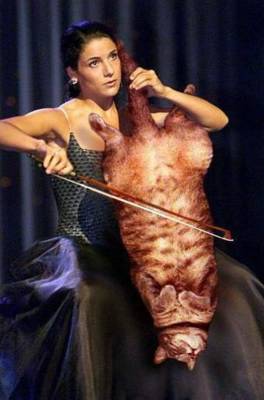The Perpetual Kitten

Le Chat Qui A Joué Fauré
Mocha, the new neighbor's cat, thinks my front lawn is her prized litter box. She prowls about my property constantly. I suppose the grass is greener on this side of the fence. There are no other usual suspects within Mocha's whisker or whiskers. Every now and then I espy a Cheshire Cat grin from you know what. Perpetual and circumstantial evidence lays it all out on the grass. It is guilty as charged.
Yet there is more than one way to sleuth a cat. I have just the title and jacket cover for the next Lilian Jackson Braun thriller, "Le Chat Qui A Joué Fauré"* (The Cat Who Played Fauré). It suits nicely as the sequel to "The Cat Who Played Brahms." I should have my people call her people to do a Kit Kat bar power munch and hash out a contract.
There is always someone like Rindawriter who loves cats and speaks to them the Dr. Doolittle way, however.
To each his own meow.
* Fauré: Complete Works for Cello






1 comments:
Just responding to your comments on my blog on Perpetual Kitten. (And, by the way, my cats are all indoor cats who are given runs outside on their harnesses and leashes, just like dogs, and who also have a nice cat run into which they can "go outside" to watch birds, etc. They seem very contented. We also keep our back yard as a bird sanctuary.) Cats that roam through the yard are reprimanded verbally or with spray shots of water if they are seen chasing birds or squirrels. They seem to get the picture,quickly, as to leaving birds and squirrels alone.
Your neighbors should be keeping their cats inside with clean litterboxes. A cat's lifespan is less than five years if it is allowed to roam outside but can be up to eighteen if it is kept indoors. Some "cat" style honest talking from with your neighbors and your community ordinance makers would seem to be appropriate here. Ditto for problem neighbor dogs as well. The animals and their owners can learn boundaries of courteious behavior to neighbors--if the owners are willing to learn.
I have been told that orange peelings and human urine are useful deterrants to cats pooping on lawns. My approach is to keep thick grass on the lawn and flower beds covered with wire netting in the spring--to keep out the racoons and squirrels as well as the cats.
Both dogs and cats respond, behavioraly, to human behaviors and vocal tones and vocal communications. It all depends on the patience and expertise of the human who is trying to communicate with an animal as to how positively the animal will respond. My cats, for example, are trained to not scratch living room furniture, to stay out of the kitchen, to not eat human food off plates set with their reach, and to tolerate each other. This was all done vocally, from me, with no food rewards. All three came from abusive or feral conditions. All three have learned to become well-behaved animals and wonderful house pets. We can leave them for hours together at a time with confidence that neither they nor the house will be ripped up when we return.
Perhaps you can increase your understanding of animals by reading some books on them from the library or watching documentaries about them. Or, better yet, volunteer some time at your local wildlife or cat and dog shelters.
Post a Comment